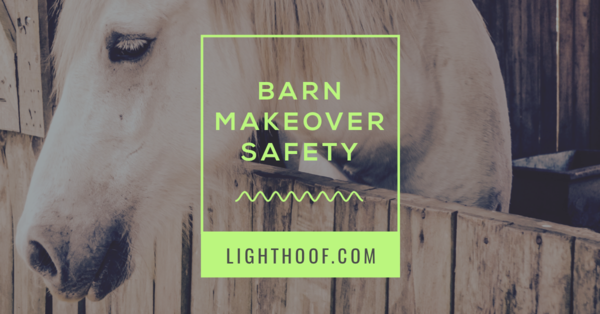This speaks directly to the owners of stables and boarding facilities, like myself, who have a human community to nurture right now in addition to their herd of horses.
As barn owners, we are already busy from the crack of dawn to the crack of the next dawn with the daily responsibilities of caring for our clients’ horses. Even if we had oodles of time to prep our management strategies for unprecedented crisis situations, such as a global pandemic, it’s hard to pin down the specifics without really knowing what’s coming.
To be honest, this is the first pandemic I’ve lived through (well, knock on wood...) but as the owner of a business that makes and sells a product (Lighthoof equine mud control panels), as well as a 40 horse boarding facility, I’ve grown accustomed to operating under the assumption that the manure is about to hit the fan.
I’ve dealt with all sorts of crises from unplanned staff changes, to broken water mains, to collapsing buildings, to canceled events, to large-scale equine biosecurity lockdowns.
I guess what I’m trying to say is that while “extreme large-herd human corralling” may be a new event for me, but it’s definitely not the first rodeo.
And if you think about it, it’s probably not yours either. However, if you need some inspiration on how to handle this with invisible aids, here’s what I have for you.
Be a Leader, But Don’t Step Out of Your Role
You will need to speak to your clients about the situation and they will be looking to you to provide guidance, but you don’t have to become an expert in something you are not.
Curate a limited amount of content on the topic from the most reliable resources. Find information that’s relevant to your situation and deliver it as it applies to your clients. Don’t overwhelm them with information that they’ve likely already seen, or worse, fill the space with information that’s possibly inaccurate or not helpful.
Breathe First, Then Wait, Then Act
When I was in training to become a Wilderness First Responder, we had a saying that when we encountered a disaster that needed response we were supposed to stop and smoke an entire cigarette before taking action. Yes, they really told us that.
Obviously, they didn’t actually condone tobacco use for any purpose, and neither do I. But the point was that the kind of perspective that you gain from a few seconds, or days, of observation, can give you the little bit of hindsight that you need to make the right decision and reduce mistakes or panic.
If you need help planning your response, here’s a general business pandemic planning guide from the Snohomish, WA Health District that’s really simple and useful.
Spend Some Time in Everybody’s Shoes
But not literally, stay six feet away from them for goodness sake.
There’s a lot of grey area and debate on how equestrian business specifically should respond to a human viral outbreak situation and related government mandates, so you are going to have to make some hard choices on your own. Things are changing daily, so you will have to make all those hard decisions again and again.
How you address your clients and make choices on policy changes and emergency actions should be informed by the effect they will have on all parties involved. This can be a “thought experiment” rather than an actual back and forth.
First, identify everyone who will be impacted by your response and imagine that you are them being affected by you. Examples of real humans to consider are your boarders, lesson clients, staff, vendors, your local community, your global community, your family, and yourself.
Increase Communication Like Crazy
Double, even triple, your touchpoints with your clients. If they are in a position where their access to their horse is limited, they will be stressed and worried and need your communication and transparency even more. If you normally only reach out if there’s a problem, now’s the time to be reaching out to everyone who’s horse is doing fine.
Be available. Make sure your clients know they can be directly in touch with you as much as they want. Think of ways to keep your community connected virtually, FB group, video chat, watch parties (online), etc are good ways to maintain the mental health of your members who normally rely on their barn time to stay positive and calm in hard times.
Be Stable but Be Authentic
Your clients want to see stability and grace coming from the barn’s leadership. This will give them confidence in your ability to weather the storm and quell any worries that their horses’ care is going to suffer at this time.
However, pretending everything is OK will come back to bite you sooner or later. It’s also not very believable. When your stressed or sad, admit it to yourself. Give yourself permission and forgiveness. When you’re ready, share it with your community and reemphasize that you’re soldering on. Your people will rally around you.
Finally, hug your horse. For those of us who are huggers and haven’t gotten to do it in a while, the struggle to snuggle is real! If you’re able to be with your horse at all right now, use that time to feel close to someone. And remember, this too shall pass.
Love and hugs from the Lighthoof equine mud management family. ️
️
As barn owners, we are already busy from the crack of dawn to the crack of the next dawn with the daily responsibilities of caring for our clients’ horses. Even if we had oodles of time to prep our management strategies for unprecedented crisis situations, such as a global pandemic, it’s hard to pin down the specifics without really knowing what’s coming.
To be honest, this is the first pandemic I’ve lived through (well, knock on wood...) but as the owner of a business that makes and sells a product (Lighthoof equine mud control panels), as well as a 40 horse boarding facility, I’ve grown accustomed to operating under the assumption that the manure is about to hit the fan.
I’ve dealt with all sorts of crises from unplanned staff changes, to broken water mains, to collapsing buildings, to canceled events, to large-scale equine biosecurity lockdowns.
I guess what I’m trying to say is that while “extreme large-herd human corralling” may be a new event for me, but it’s definitely not the first rodeo.
And if you think about it, it’s probably not yours either. However, if you need some inspiration on how to handle this with invisible aids, here’s what I have for you.
Be a Leader, But Don’t Step Out of Your Role
You will need to speak to your clients about the situation and they will be looking to you to provide guidance, but you don’t have to become an expert in something you are not.
Curate a limited amount of content on the topic from the most reliable resources. Find information that’s relevant to your situation and deliver it as it applies to your clients. Don’t overwhelm them with information that they’ve likely already seen, or worse, fill the space with information that’s possibly inaccurate or not helpful.
Breathe First, Then Wait, Then Act
When I was in training to become a Wilderness First Responder, we had a saying that when we encountered a disaster that needed response we were supposed to stop and smoke an entire cigarette before taking action. Yes, they really told us that.
Obviously, they didn’t actually condone tobacco use for any purpose, and neither do I. But the point was that the kind of perspective that you gain from a few seconds, or days, of observation, can give you the little bit of hindsight that you need to make the right decision and reduce mistakes or panic.
If you need help planning your response, here’s a general business pandemic planning guide from the Snohomish, WA Health District that’s really simple and useful.
Spend Some Time in Everybody’s Shoes
But not literally, stay six feet away from them for goodness sake.
There’s a lot of grey area and debate on how equestrian business specifically should respond to a human viral outbreak situation and related government mandates, so you are going to have to make some hard choices on your own. Things are changing daily, so you will have to make all those hard decisions again and again.
How you address your clients and make choices on policy changes and emergency actions should be informed by the effect they will have on all parties involved. This can be a “thought experiment” rather than an actual back and forth.
First, identify everyone who will be impacted by your response and imagine that you are them being affected by you. Examples of real humans to consider are your boarders, lesson clients, staff, vendors, your local community, your global community, your family, and yourself.
Increase Communication Like Crazy
Double, even triple, your touchpoints with your clients. If they are in a position where their access to their horse is limited, they will be stressed and worried and need your communication and transparency even more. If you normally only reach out if there’s a problem, now’s the time to be reaching out to everyone who’s horse is doing fine.
Be available. Make sure your clients know they can be directly in touch with you as much as they want. Think of ways to keep your community connected virtually, FB group, video chat, watch parties (online), etc are good ways to maintain the mental health of your members who normally rely on their barn time to stay positive and calm in hard times.
Be Stable but Be Authentic
Your clients want to see stability and grace coming from the barn’s leadership. This will give them confidence in your ability to weather the storm and quell any worries that their horses’ care is going to suffer at this time.
However, pretending everything is OK will come back to bite you sooner or later. It’s also not very believable. When your stressed or sad, admit it to yourself. Give yourself permission and forgiveness. When you’re ready, share it with your community and reemphasize that you’re soldering on. Your people will rally around you.
Finally, hug your horse. For those of us who are huggers and haven’t gotten to do it in a while, the struggle to snuggle is real! If you’re able to be with your horse at all right now, use that time to feel close to someone. And remember, this too shall pass.
Love and hugs from the Lighthoof equine mud management family.




Leave a comment
This site is protected by hCaptcha and the hCaptcha Privacy Policy and Terms of Service apply.